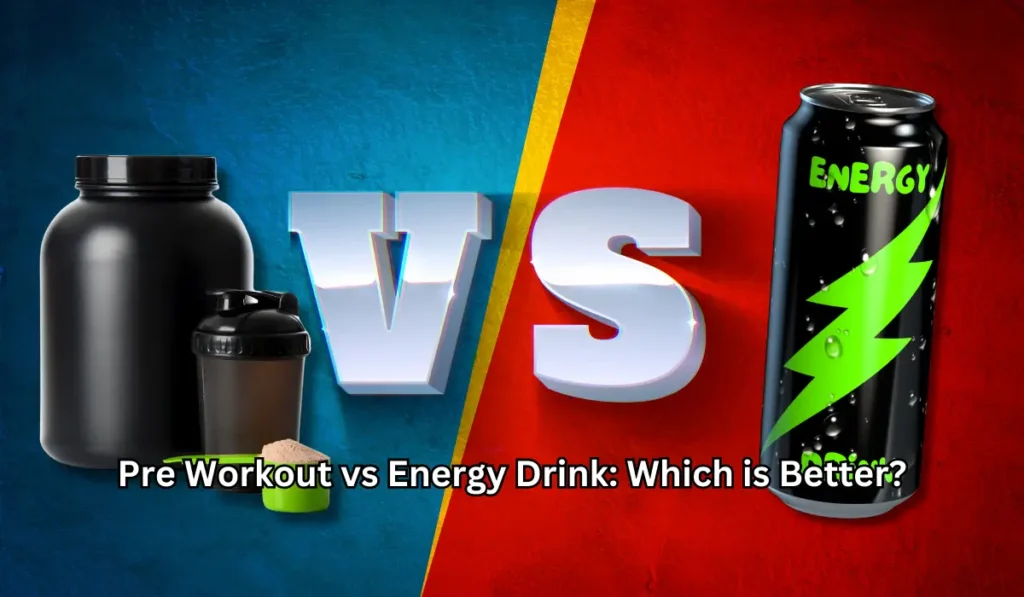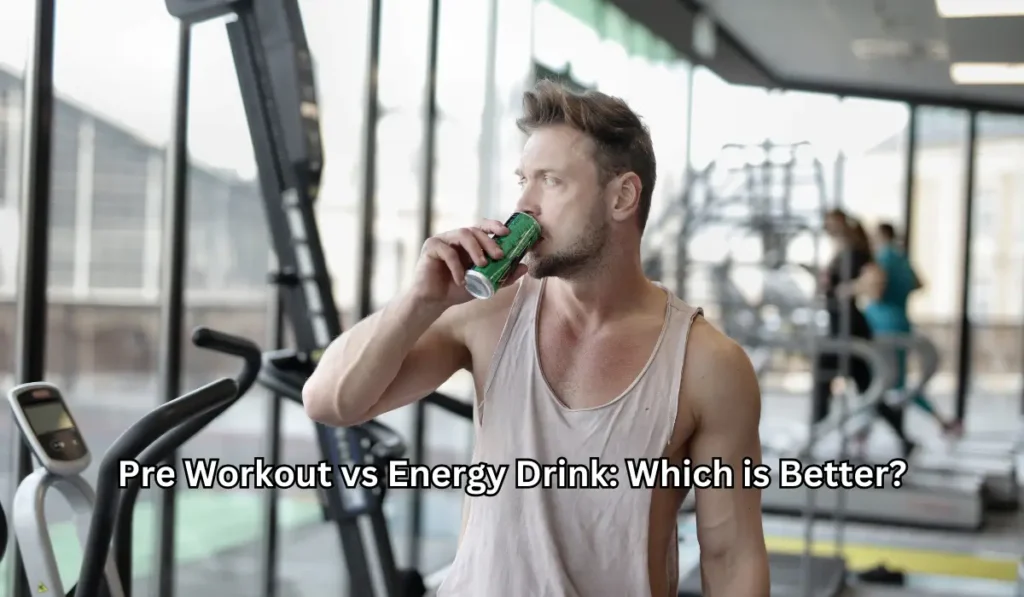
Pre Workout vs Energy Drink: Which is Better?
Are you looking for a quick energy boost before hitting the gym or going for a run? There are plenty of options out there, but two of the most popular choices are pre workout supplements and energy drinks. While they may seem similar, there are some key differences that can make one better suited for your needs than the other.
In this blog post, we’ll take an in-depth look at the pros and cons of pre workout supplements and energy drinks. We’ll explore the ingredients, effects, and potential side effects of each option, as well as how they can impact your workout and overall health.
Whether you’re a seasoned athlete or a beginner just starting to explore fitness, understanding the differences between pre workout supplements and energy drinks can help you make an informed decision about which option is right for you. So let’s dive in and explore the world of pre workout vs energy drink!
Understanding Pre Workout Supplements
Pre workout supplements are a type of dietary supplement that are designed to be taken before a workout or exercise session. They typically contain a combination of ingredients that are intended to increase energy, enhance focus and mental alertness, and improve physical performance.
The specific ingredients in pre workout supplements can vary, but some of the most common ones include caffeine, beta-alanine, creatine, and nitric oxide boosters. These ingredients are intended to work together to provide a range of benefits, such as increasing energy and endurance, reducing fatigue, and enhancing muscle pumps.
It’s important to note that pre workout supplements are not regulated by the FDA, so there is no guarantee that they are safe or effective. Some ingredients in these supplements can also have potential side effects or interact with other medications or supplements, so it’s important to talk to your doctor before starting to use them.
Overall, pre workout supplements can be a useful tool for athletes and fitness enthusiasts who are looking to boost their performance and get the most out of their workouts. However, it’s important to use them carefully and responsibly, and to be aware of the potential risks and side effects associated with their use.
Read about Pre Workout Crossfit
Pros and Cons of Pre Workout Supplements
Pros:
- Increased energy and endurance: Pre workout supplements can provide a quick burst of energy and help delay fatigue, allowing you to push through intense workouts or exercise sessions.
- Improved focus and mental alertness: Some pre workout supplements contain ingredients that can enhance cognitive function and improve mental focus, making it easier to stay on task during your workout.
- Enhanced muscle pumps: Pre workout supplements can help increase blood flow to the muscles, which can lead to a better “pump” and improved muscle size and definition.
- Convenient and easy to use: Pre workout supplements are usually available in powder or pill form and can be easily mixed with water or other beverages, making them a convenient option for people who are always on the go.
Cons:
- Potential side effects: Some pre workout supplements contain high levels of caffeine or other stimulants, which can cause jitteriness, anxiety, and other side effects in some people.
- Risk of overuse: Because pre workout supplements can be so effective at boosting energy and performance, there is a risk that some people may become overly reliant on them and use them too frequently or at too high of a dose.
- Lack of regulation: Pre workout supplements are not regulated by the FDA, which means that there is no guarantee that they are safe or effective.
- Cost: Pre workout supplements can be expensive, especially if you opt for higher-end brands or products with multiple ingredients.
Overall, pre workout supplements can be a useful tool for people who are looking to enhance their athletic performance or get the most out of their workouts. However, they should be used with caution and only under the guidance of a healthcare professional, as there are potential risks and side effects associated with their use.
Read about Keto Workout Plan

Understanding Energy Drinks
Energy drinks are a type of beverage that are designed to provide a quick burst of energy and enhance mental alertness and physical performance. They typically contain a combination of ingredients such as caffeine, taurine, B vitamins, and sugar or artificial sweeteners.
The specific ingredients in energy drinks can vary, but caffeine is often the main active ingredient. Many energy drinks contain high levels of caffeine, which can provide a quick boost of energy and improve mental alertness.
Energy drinks are often marketed towards young adults and athletes, and are commonly consumed before workouts or athletic events. They are also popular as a pick-me-up during the day, or as a way to stay awake and alert while studying or working.
It’s important to note that energy drinks can have potential risks and side effects. High levels of caffeine can cause jitteriness, anxiety, and other side effects, especially in people who are sensitive to caffeine. The high sugar content in some energy drinks can also contribute to weight gain and other health problems if consumed in excess.
Overall, energy drinks can provide a quick and convenient way to boost energy and enhance mental and physical performance. However, they should be consumed in moderation and with caution, and individuals should be aware of the potential risks and side effects associated with their use.
Pros and Cons of Energy Drinks
Pros:
- Increased energy and mental alertness: Energy drinks can provide a quick boost of energy and enhance mental focus and alertness, making them useful for people who need to stay awake and focused during long work or study sessions.
- Convenient and easy to use: Energy drinks are widely available and can be easily purchased at grocery stores, gas stations, and convenience stores, making them a convenient option for people on the go.
- Variety of flavors and options: Energy drinks come in a variety of flavors and formulations, allowing people to choose the one that best suits their taste preferences and energy needs.
- Can enhance athletic performance: Energy drinks can be useful for athletes who need a quick burst of energy and mental focus before a workout or competition.
Cons:
- Potential health risks: High levels of caffeine and sugar in energy drinks can lead to potential health risks, such as high blood pressure, heart problems, and obesity.
- Overconsumption: People may become reliant on energy drinks and consume them in excessive amounts, which can lead to negative side effects and long-term health problems.
- Interactions with other substances: Energy drinks can interact with other medications or supplements, potentially leading to negative side effects or health complications.
- Not recommended for certain populations: Children, pregnant women, and people with certain health conditions should not consume energy drinks due to potential health risks.
Overall, energy drinks can be useful for people who need a quick and convenient way to boost energy and mental focus. However, they should be consumed in moderation and with caution, and individuals should be aware of the potential health risks and negative side effects associated with their use.
Key Differences Between Pre Workout Supplements and Energy Drinks
While both pre workout supplements and energy drinks are designed to provide a quick burst of energy and enhance mental and physical performance, there are some key differences between the two:
- Ingredients: Pre workout supplements typically contain a combination of ingredients such as caffeine, beta-alanine, creatine, and nitric oxide boosters, while energy drinks usually contain high levels of caffeine, taurine, B vitamins, and sugar or artificial sweeteners.
- Timing: Pre workout supplements are meant to be consumed before a workout or exercise session, while energy drinks can be consumed at any time during the day.
- Focus: Pre workout supplements are primarily designed to enhance physical performance and endurance, while energy drinks are more focused on providing a quick burst of mental energy and focus.
- Regulation: Pre workout supplements are not regulated by the FDA, while energy drinks are subject to FDA regulations.
- Potential side effects: Both pre workout supplements and energy drinks can have potential side effects, but the specific side effects may differ due to differences in ingredients and formulation.
Overall, while there are some similarities between pre workout supplements and energy drinks, the specific ingredients, timing, and focus of each product can make one more suitable for certain individuals or situations than the other. It’s important to carefully evaluate the potential benefits and risks of each option before deciding which one to use.
Which Option is Better for Your Fitness Goals?
Determining whether pre workout supplements or energy drinks are better for your fitness goals depends on several factors, including your personal preferences, fitness level, and overall health.
If you’re looking to enhance physical performance and endurance, pre workout supplements may be a better option for you. They are specifically designed to provide a quick burst of energy and enhance athletic performance, which can help you push through intense workouts or exercise sessions. Additionally, pre workout supplements can contain ingredients that may be beneficial for muscle growth, such as creatine.
On the other hand, if you’re looking for a quick boost of mental energy and focus, energy drinks may be more suitable. They can provide a quick pick-me-up during long work or study sessions, or before athletic events that require mental focus and alertness.
It’s important to note that both pre workout supplements and energy drinks can have potential risks and side effects, and should be used with caution. It’s also important to consider the potential health risks associated with high levels of caffeine and sugar consumption, and to limit your intake accordingly.
Ultimately, the best option for your fitness goals will depend on your individual needs and preferences. It may be helpful to consult with a healthcare professional or fitness expert to determine which option is best for you.

Potential Side Effects to Watch Out For
Both pre workout supplements and energy drinks can have potential side effects, and it’s important to be aware of these risks before using them. Some of the most common side effects of both pre workout supplements and energy drinks include:
- Jitteriness and nervousness
- Insomnia or difficulty sleeping
- Increased heart rate and blood pressure
- Headaches
- Nausea or stomach upset
- Dehydration
- Anxiety and panic attacks
- Muscle cramps or weakness
In addition, pre workout supplements may have additional side effects depending on the specific ingredients included in the product. For example, beta-alanine may cause a tingling or flushing sensation in some people, while creatine may lead to gastrointestinal discomfort.
It’s important to use pre workout supplements and energy drinks as directed, and to avoid exceeding the recommended dose. Additionally, it’s important to talk to your doctor before using these products, especially if you have underlying health conditions or are taking other medications or supplements.
If you experience any negative side effects from pre workout supplements or energy drinks, it’s important to stop using them immediately and seek medical attention if necessary.
